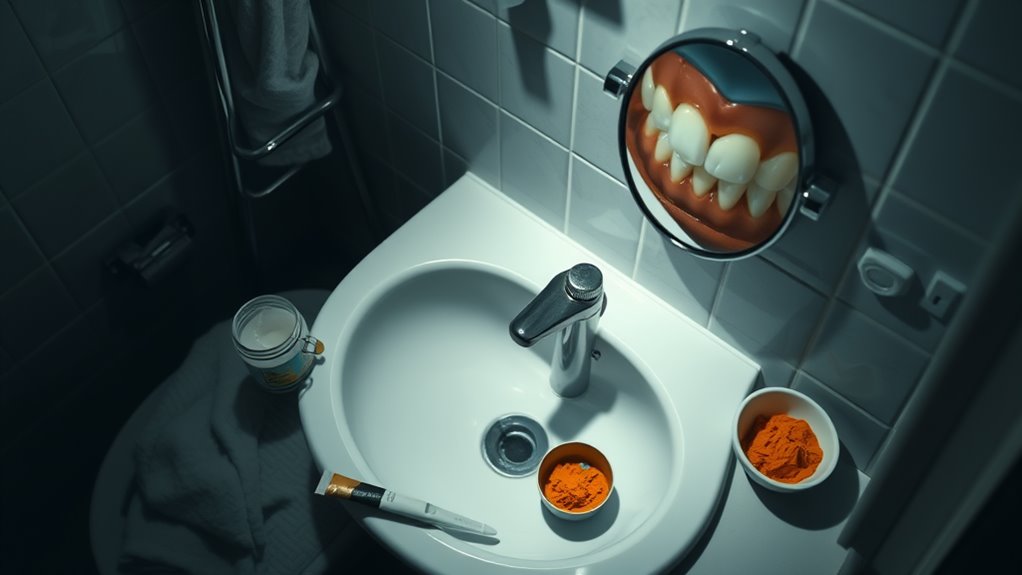I Switched to This Routine and My Toothache Stopped Coming Back
By switching to a consistent dental hygiene routine—brushing twice daily with fluoride toothpaste, daily flossing, and incorporating a balanced diet—you can effectively stop recurring toothaches. Prioritizing these practices reduces plaque buildup and promotes enamel strength, minimizing risks related to cavities and gum disease. Additionally, regular dental check-ups facilitate early detection of problems, ensuring optimal oral health. If you’re curious about further strategies to maintain your dental wellness, there are more insights to discover.
Understanding the Causes of Toothaches
Toothaches often arise from various underlying issues, which means understanding their causes is essential for effective relief. Common culprits include cavities, gum disease, and dental abscesses.
To enhance toothache prevention, identify risk factors like poor diet or irregular dental visits. Addressing these factors proactively can mitigate pain and protect your oral health, making timely intervention crucial for long-term benefits. Furthermore, poor oral hygiene fosters plaque growth, leading to complications that can worsen toothaches.
Essential Dental Hygiene Practices
Maintaining proper dental hygiene is crucial for preventing toothaches and ensuring overall oral health.
Brush your teeth at least twice daily with fluoride toothpaste, and floss once daily to remove plaque between teeth.
Regular dental check-ups assist in early detection of potential issues.
Additionally, consider using an antibacterial mouthwash to reduce harmful bacteria.
Implementing these practices can significantly decrease your risk of toothaches, as good oral hygiene reduces the risk of systemic diseases, such as heart disease.
The Role of Diet in Oral Health
While dental hygiene practices form the foundation of oral health, the role of diet can’t be overlooked. Consuming nutrient-dense foods like fruits, vegetables, and dairy provides essential vitamins and minerals that bolster tooth enamel and support gum health. Conversely, high-sugar and acidic foods promote bacterial growth, leading to decay. Maintaining a balanced diet is critical for preventing oral health issues and ensuring long-term wellness. Additionally, good oral hygiene can prevent serious health issues linked to poor dental care.
Preventative Measures to Consider
Since dental discomfort can arise from various sources, implementing effective preventative measures is essential for reducing the risk of toothaches. Regular dental check-ups and proper oral hygiene practices can significantly mitigate potential issues. Below is a concise table outlining key preventative measures:
| Measure | Frequency |
|---|---|
| Professional cleanings | Every 6 months |
| Daily brushing | Twice daily |
| Flossing | Once daily |
Additionally, maintaining regular check-ups can help identify early signs of decay and systemic health issues that might be unnoticed.
Lifestyle Changes for Better Oral Health
In addition to regular dental visits and effective hygiene practices, certain lifestyle changes can significantly enhance your oral health.
Incorporate a balanced diet, rich in vitamins and minerals, to strengthen enamel. Hydration aids saliva production, which neutralizes acids.
Reducing sugar and tobacco consumption minimizes decay and gum disease risks. Practicing stress management techniques can also lower teeth grinding, protecting your dental structure. Additionally, ensuring adequate Vitamin D levels is essential for maintaining strong teeth and preventing decay.
The Importance of Regular Dental Check-ups
Regular dental check-ups are crucial for maintaining optimal oral health, as they allow for early detection and treatment of potential issues. By visiting your dentist regularly, you can prevent cavities, gum disease, and ensure proper alignment. These appointments also provide professional cleanings that remove plaque buildup. Additionally, sugar consumption can have a significant impact on your dental health, making these check-ups essential for identifying hidden problems early.




